Is Durian Good for Diet? Revolutionize Your Diet!
Durian can be a part of a diet plan, but moderation is key due to its high calorie and sugar content. Its rich nutrient profile provides vitamins and minerals essential for health.
Durian is a nutritious fruit that offers various health benefits:
However, due to its high caloric density and sugar content, portions should be controlled:
Durian is a nutritious yet calorie-dense fruit, making portion control essential when consumed as part of a diet.

Key Takeaway
Nutritional Breakdown of Durian for Diet Consideration
| Nutrient | Amount per Serving (1 cup, chopped) | % Daily Value* |
|---|---|---|
| Calories | 350 | 17.5% |
| Carbohydrates | 66 g | 22% |
| Protein | 2.6 g | 5.2% |
| Fat | 13 g | 20% |
| Fiber | 9 g | 36% |
| Vitamin C | 80% | 80% |
| Thiamine (B1) | 0.4 mg | 33% |
| Vitamin B6 | 0.4 mg | 31% |
| Potassium | 1059 mg | 30% |
| Iron | 1.1 mg | 14% |
| Magnesium | 84 mg | 20% |
Understanding Durian Nutrition

Durian, often referred to as the ‘king of fruits,’ contains a diverse array of nutrients, including a significant amount of dietary fiber, vitamins, and minerals essential for a balanced diet.
Its rich composition includes vitamin C, which is crucial for immune function, and B-vitamins, particularly folic acid, which supports cellular health.
The fruit is also a source of important minerals such as potassium, which aids in maintaining proper heart function, and manganese, which plays a role in bone formation and metabolic regulation.
For individuals seeking to incorporate nutrient-dense options into their dietary regimen, durian can be a valuable addition.
However, it is calorie-dense and contains natural sugars, so portion control is advised to align with dietary goals and energy requirements.
Caloric Content Analysis
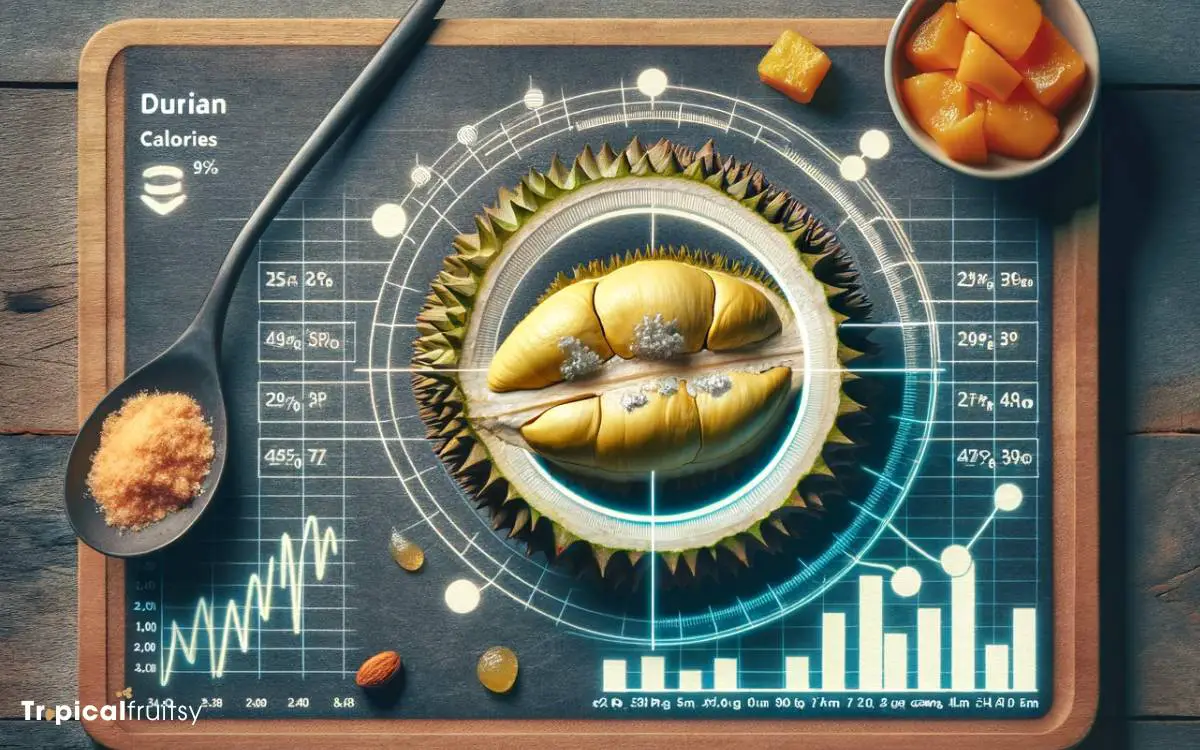
When assessing the suitability of durian for dietary purposes, it is critical to evaluate its caloric content to inform balanced eating choices.
A comparative analysis of the energy value of durian against other fruits can provide clients with a clear perspective on where durian fits within a calorie-controlled diet.
It is also essential to emphasize the importance of portion size, as this directly influences the total caloric intake from consuming this nutrient-dense fruit.
Durian Calorie Density
The caloric content of durian, often referred to as the ‘king of fruits’, is relatively high, with an average of 147 calories per 100 grams, necessitating careful consideration for those on calorie-restricted diets.
Here are some important aspects to consider:
- A single durian can weigh around 1kg, providing up to 1,470 calories.
- This calorie level rivals that of some fast-food meals, potentially impacting weight management.
- Durian contains healthy monounsaturated fats, but they are calorie-dense.
- It is also rich in dietary fiber and vitamins, which are beneficial for overall health.
When integrating durian into your diet, it’s crucial to balance its caloric density with its nutritional value.
Energy Value Comparison
Comparative analysis of caloric content reveals that durian offers significantly more energy per 100 grams than most common fruits, such as apples and oranges.
Specifically, durian contains approximately 147 calories per 100 grams, while apples and oranges provide about 52 and 47 calories per 100 grams, respectively.
For individuals seeking a calorie-dense food to incorporate into their diet, durian could be a suitable option.
Its rich calorie content may be especially beneficial for those with high energy demands or those involved in intensive physical activities.
However, for those managing calorie intake for weight loss or maintenance, it is crucial to consume durian in moderation, considering its high energy value compared to other fruits. Balancing durian consumption with a varied diet is key.
Portion Size Consideration
Portion control is imperative when incorporating durian into a dietary regimen due to its high caloric density.
To emphasize the importance of mindful eating, consider the following:
- A single cup of durian contains approximately 357 calories.
- This portion also delivers around 13 grams of fat.
- It’s equivalent to the caloric value of about two chocolate bars.
- Overconsumption could lead to a surplus in daily caloric intake, potentially resulting in weight gain.
When advising clients, it’s essential to balance the nutritional benefits with the caloric impact of durian.
Tailoring portion sizes to individual dietary needs ensures that durian can be enjoyed without compromising weight management goals.
Durian’s Fiber Factor

Durian’s high dietary fiber content is a key component that may positively influence diet and weight management.
Dietary fiber, an indigestible part of plant foods, plays a crucial role in maintaining digestive health by normalizing bowel movements and preventing constipation.
Furthermore, fiber contributes to satiety, the feeling of fullness, which can help control appetite and potentially reduce overall calorie intake.
For individuals focused on weight control or digestive wellness, incorporating fiber-rich foods like durian can be beneficial. A single serving of durian provides a significant amount of the daily recommended fiber intake, supporting these dietary goals.
Sugar Levels in Durian
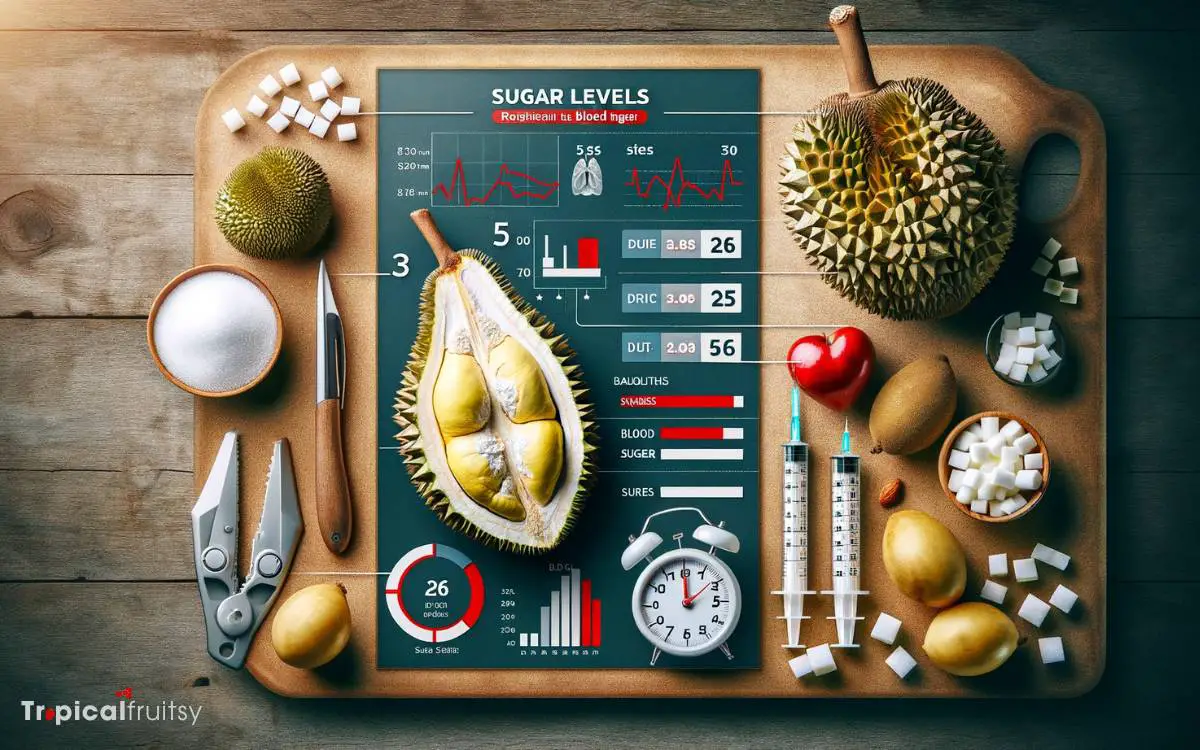
When considering durian for dietary purposes, it is essential to be aware of its natural sugar content, which may influence calorie intake and energy levels.
The glycemic index ranking of durian provides insight into how the fruit might affect blood glucose levels, a crucial factor for individuals managing diabetes or those mindful of blood sugar fluctuations.
Understanding the impact of durian’s sugar levels on the body is key to integrating this fruit into a balanced and health-conscious diet.
Durian Natural Sugar Content
The natural sugar content in durian is relatively high, with an average of about 27 grams per cup of the fruit, which may impact its suitability for certain diets.
This level of sugar, primarily composed of sucrose, fructose, and glucose, is a critical factor to consider when incorporating durian into a health-conscious eating plan.
To truly understand the implications for your diet, consider these points:
- Durian’s glycemic index is moderate, meaning it causes a more gradual increase in blood sugar.
- Each serving provides a substantial energy boost, which can be beneficial for active individuals.
- The presence of fiber in durian helps mitigate the absorption rate of sugar.
- Mindful consumption is key; enjoying durian in moderation can align with a balanced dietary approach.
Selecting durian as part of your diet requires a nuanced understanding of its sugar content and its potential effects on your overall nutritional goals.
Glycemic Index Ranking
Considering its sugar content, durian has a moderate glycemic index (GI) of around 49, which categorizes it as a low to medium GI food and may influence its role in a diet plan.
The glycemic index is a ranking system for carbohydrates based on their effect on blood glucose levels. Foods with a low to medium GI are digested more slowly, causing a lower and slower rise in blood glucose and, consequently, insulin levels.
Here’s a visual comparison of GI rankings:
| Food Type | Glycemic Index (GI) |
|---|---|
| Low GI Foods | 55 or less |
| Durian | ~49 |
| High GI Foods | 70 or above |
Choosing foods like durian with a moderate GI may support blood sugar management in a balanced diet.
Impact on Blood Glucose
How does durian consumption affect blood glucose levels, given its moderate glycemic index? This is a critical consideration for individuals managing their dietary intake for health and wellness.
Durian’s impact on blood sugar can be summarized as follows:
- Moderate glycemic index implies a slower release of glucose into the bloodstream.
- Consumption in moderation may prevent sharp spikes in blood sugar levels.
- High fiber content aids in the regulation of glucose absorption.
- Portion control is essential to maintain optimal blood glucose levels.
When consumed responsibly, durian can be part of a balanced diet without causing detrimental effects on blood glucose. This is particularly important for those with insulin sensitivities or diabetes.
Understanding the nutritional content of durian extends beyond its sugar content; next, we will delve into the vitamins and minerals breakdown.
Vitamins and Minerals Breakdown
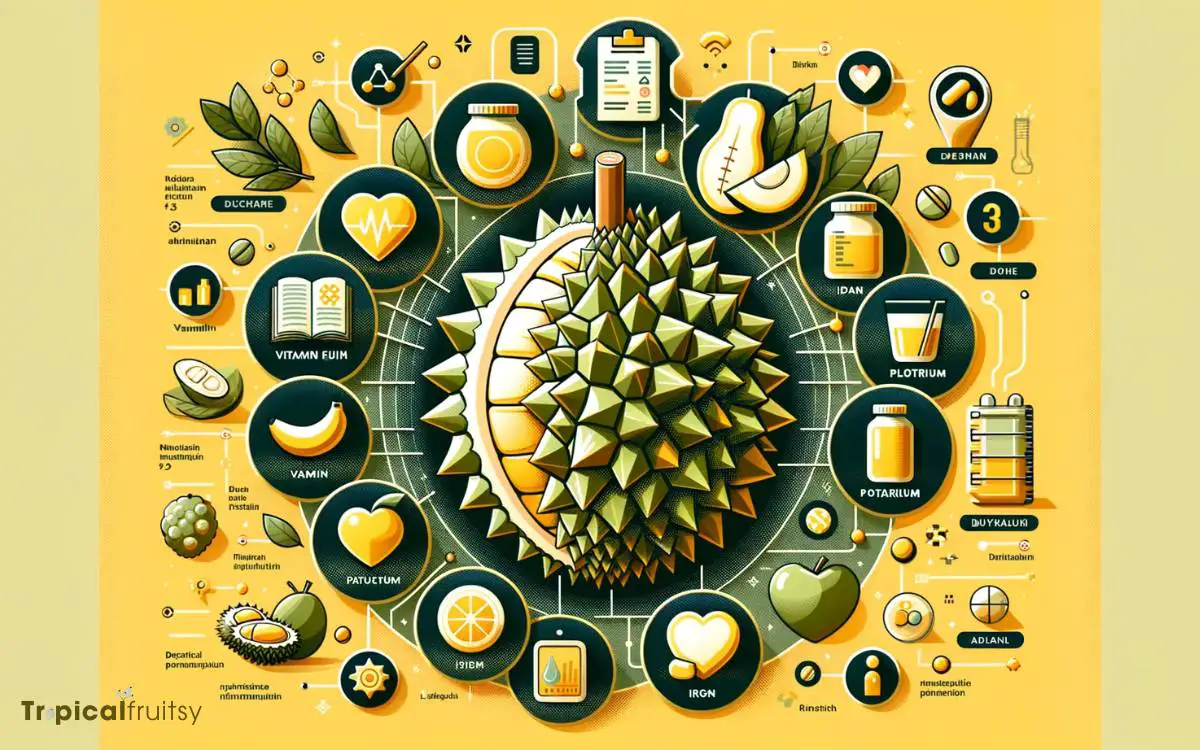
Durian fruit is rich in essential vitamins and minerals, including vitamin C, B vitamins, potassium, and magnesium, which are vital for maintaining a healthy diet.
Vitamin C is a powerful antioxidant that supports immune function and skin health. B vitamins play a critical role in energy metabolism, helping to convert food into usable energy.
Potassium is essential for maintaining proper heart function and regulating blood pressure, while magnesium supports over 300 biochemical reactions in the body, including muscle and nerve function.
Incorporating durian into one’s diet can contribute to nutritional diversity, providing these key nutrients that support overall health. However, it should be consumed in moderation due to its high calorie and sugar content.
Tailoring intake to individual dietary needs and health goals is essential for maximizing its benefits within a balanced diet.
Durian’s Role in Satiety
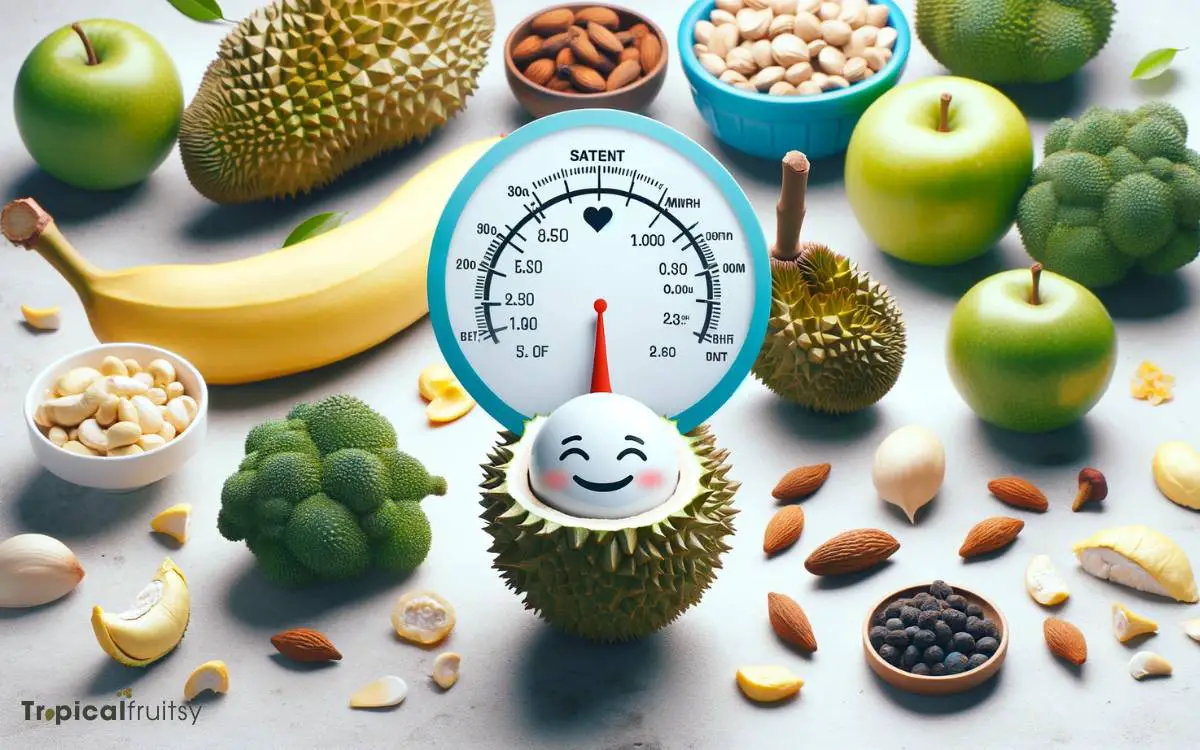
Examining the role of durian in satiety reveals that its high dietary fiber content can lead to increased feelings of fullness, aiding in weight management for those on a diet.
The consumption of durian can support dietary goals through:
- Enhancing satiety, reducing the likelihood of overeating.
- Slowing digestion, thus prolonging the sensation of fullness.
- Providing a lower energy density compared to processed snacks.
- Offering a nutrient-dense option that satisfies both hunger and nutritional needs.
For individuals aiming to achieve or maintain a healthy weight, integrating durian into their diet can be a strategic choice.
Its fiber contributes to a satisfying eating experience, which is critical in preventing unnecessary snacking and supporting overall calorie control.
Pros and Cons for Dieters
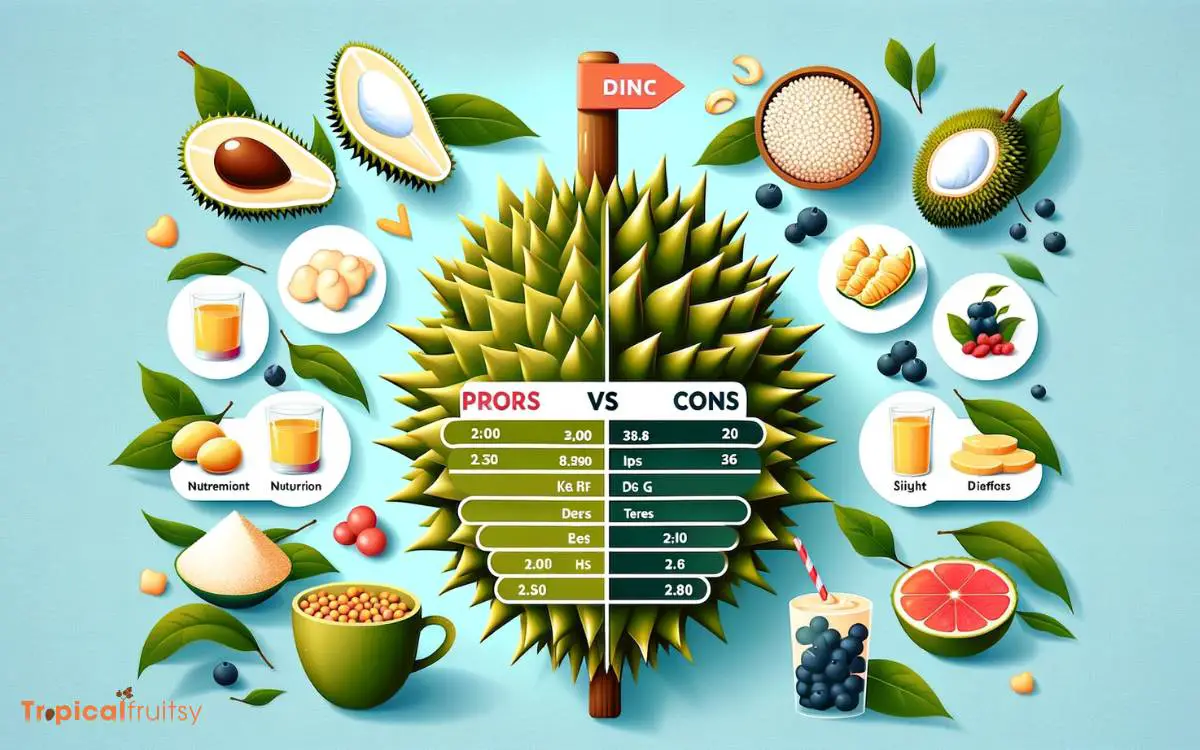
One must weigh both the benefits and drawbacks of incorporating durian into a diet plan, considering its nutritional profile alongside individual dietary needs.
Durian, often celebrated for its creamy texture and unique taste, also boasts a significant amount of dietary fiber, vitamins, and minerals essential for overall health.
However, its high caloric and fat content may be a concern for those on calorie-restricted diets.
| Pros of Durian for Dieters | Cons of Durian for Dieters |
|---|---|
| Rich in dietary fiber | High in calories |
| Contains healthy fats | Contains significant fat content |
| Source of vitamins and minerals | May lead to weight gain if overeaten |
| May improve digestion | Potentially strong aroma disliked by some |
| Satiating effect | Limited availability in some regions |
Informed decisions about durian consumption should be tailored to the dietary goals and metabolic requirements of the individual.
Conclusion
Durian, often regarded as the ‘king of fruits,’ possesses significant nutritional value, including vitamins, minerals, and dietary fiber, which can aid in satiety and potentially benefit dietary regimens.
However, its high caloric and sugar content requires mindful consumption within the context of an individual’s overall dietary goals.
For dieters, durian should be approached as a nutrient-dense treat rather than a staple, balancing its pros and cons to maintain a harmonious dietary kingdom.






